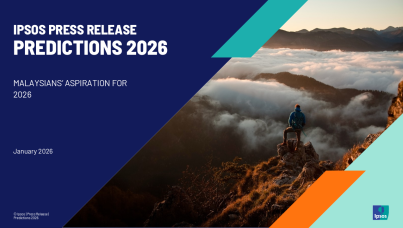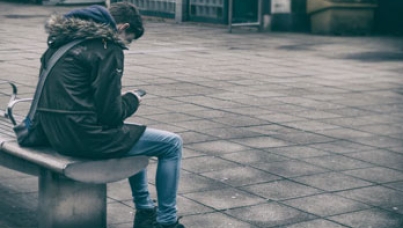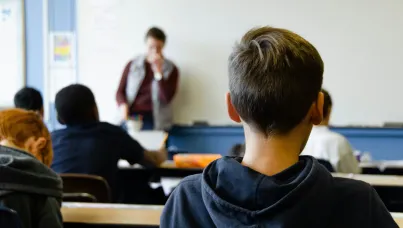Perception vs Reality:- Zero Single-Use Plastic in Malaysia
Link to 2021 Ipsos study update:-
https://www.ipsos.com/en/earth-day-2021-globally-public-ask-what-plan-tackle-climate-change
--
Key points:-
- 56% Malaysians are concerned about the issue of single-use plastic
- 70% Malaysians feel it is the Government's responsibility to find ways to reduce plastic usage
We are living in an age where disposables have become a way of life. And in this 'use and throw' lifestyle that we lead, plastic has become an indispensable part of our everyday life. Enormous amount of plastic refuse is discarded, burned and put in landfills on a daily basis. Once hailed as a wonder material, today plastic is becoming the face of all things going wrong with our environment. The blessing of 'durability' has become the curse of 'imperishability'. Single-use plastic has therefore become the poster child for environmental irresponsibility. This has resulted in a rallying cry the world over to take action against single-use plastic.
To understand how Malaysian citizens view the issue of "Plastics & its Sustainability", Ipsos Malaysia conducted a nationwide study in three waves from October 2018 to June 2019. The study highlights that although Malaysians understand the drawbacks of non-recycle plastic products on the environment and are willing to take personal actions to mitigate the risk, they are not willing to take personal actions When asked about the top 3 government initiatives to encourage citizens to recycle and reduce the use of plastics items.

The study revealed that more than half of Malaysians (56%) are concerned about the issue of single-use plastic. However, 70% of those polled felt it is the government’s responsibility to find effective ways to reduce plastic. Malaysians feel that the most effective way to reduce plastic problems is by replacing plastic products with biodegradable products (59%) as opposed to banning plastic use in daily life (42%). 21% Malaysians find imposition of higher tax on plastic items another effective way to reduce plastic problems.

When asked about the top 3 government initiatives to encourage citizens to recycle and reduce the use of plastics, 47% Malaysians want the government to provide plastic waste bins in the neighbourhood to separate rubbish/waste. Use of compostable garbage bag for waste collection (37%) and conducting of educational workshop to increase public awareness (30%) are the other two government initiatives that scored high in the poll.

Malaysians are quite receptive to recycle and thereby reduce plastic use if recycle bins are provided in the community (80%) and are willing to be involved in ‘No Plastic Waste’ movement (73%). It is worth noting that Malaysians are also willing to pay more for products that harm the environment (60%) and RM0.20 pollution charge for use of plastic bags (55%).
With no uniform approach to address the growing menace of single-use plastic, in October 2018, the Ministry of Energy, Science, Technology, Environment and Climate Change (MESTECC) had launched a ‘Roadmap Towards Zero Single-Use Plastic 2018-2030’. The vision of this Roadmap is to take a phased, evidence-based and holistic approach by involving all stakeholders in jointly addressing single-use plastics pollution in Malaysia. The Phase 1 of the Roadmap included a nationwide charge on plastic bags and to only serve plastic straws upon customer request. Keeping this in mind, earlier this year a nationwide ban on plastic bags was introduced and a charge of RM0.20 was imposed on their usage. The year 2020 would kick off with a nationwide ban on plastic drinking straws. All these steps are a push in the right direction in achieving the vision of abolishing single-use plastic by 2030.
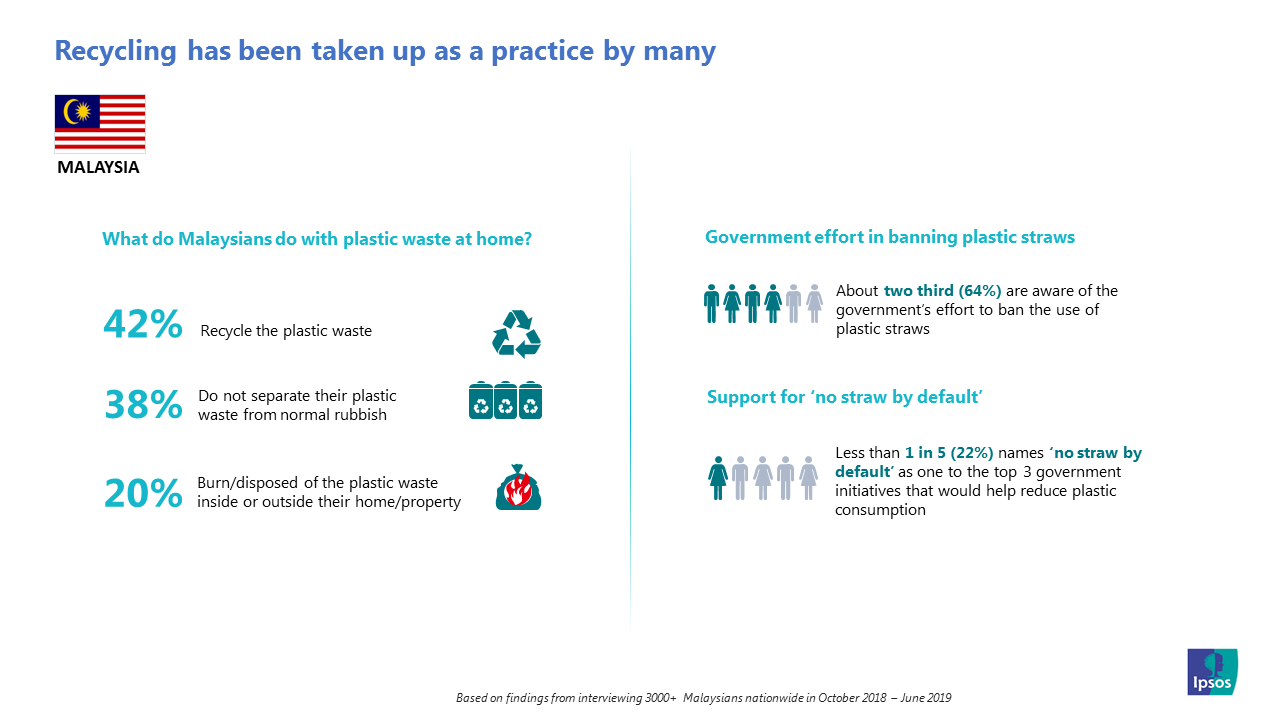
The Malaysian government is taking concrete steps to phase out single-use plastic, however, the Ipsos Malaysia study revealed that only 44% Malaysians are aware of Malaysia’s ‘Roadmap Towards Zero Single-Use Plastic’. It was heartening to see was that majority Malaysians are positive toward phasing out single use plastic, but only as long as their wallet isn’t impacted. While 59% of those polled were willing to phase out single-use plastic only if there were no price increase, 20% Malaysians were also okay with a small price increase and supported this endeavour.
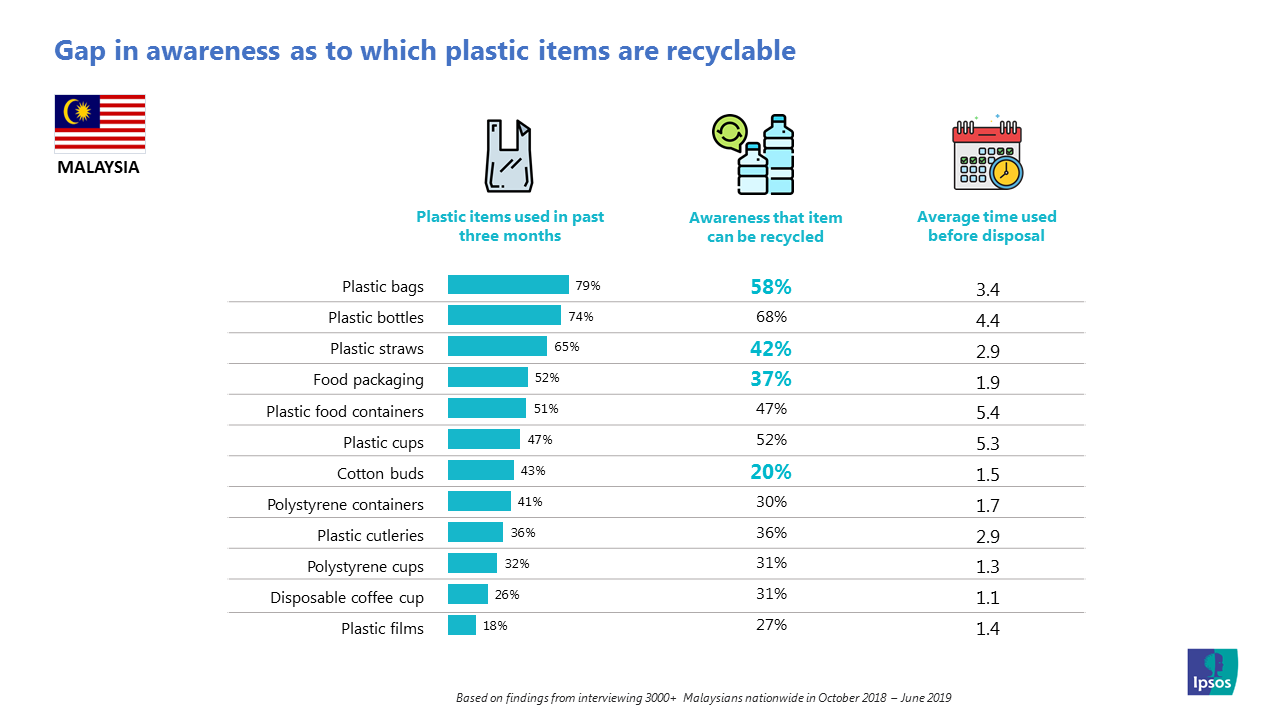
The Ipsos Malaysia survey further revealed that when it comes to personal initiatives Malaysians are willing to take, using recycle bags when purchasing things in supermarket/shops (48%) and re-using disposable items such as plastic bags and plastic bottles (37%) rank the highest. Moreover, 58% Malaysians showed their willingness to use reusable bags when shopping. To give an impetus to reusable bags, supermarket giant Tesco Malaysia had last year launched the “The Unforgettable Bag” campaign to help reduce single-use plastic bags by encouraging customers to bring back the bags for every time they shop. Tracking usage via the barcode revealed that 55% of customers who bought the bags used them ‘again and again’. This goes to show that how such initiatives can translate into a lifestyle change.
Even though early this year the Malaysian government implemented the ‘No straw by default’ practice where straw is given upon request with no charge, the Ipsos Malaysia survey revealed that only about two-third (64%) are aware of the government’s effort on plastic straw ban. What’s more, the ‘No straw by default’ practice is not Malaysians’ most preferred initiative, with only 22% believing this method would reduce the use of plastic and encourage recycling.
In the last one year, Malaysians have witnessed the government’s aggressive push to reduce single-use plastic. This has also given an impetus to the private sector whereby organizations are committing to reduce and ultimately phase out single-use plastic. A case in point is global behemoth Nestlé’s ‘war on plastic waste’. Nestlé Malaysia is aiming at 100% recyclable or reusable packaging by 2025. And to kick-start its ‘war on plastic waste’, Nestlé Malaysia will be rolling out new packaging for its 125ml MILO UHT packet drinks, which will have paper straws instead of plastic.
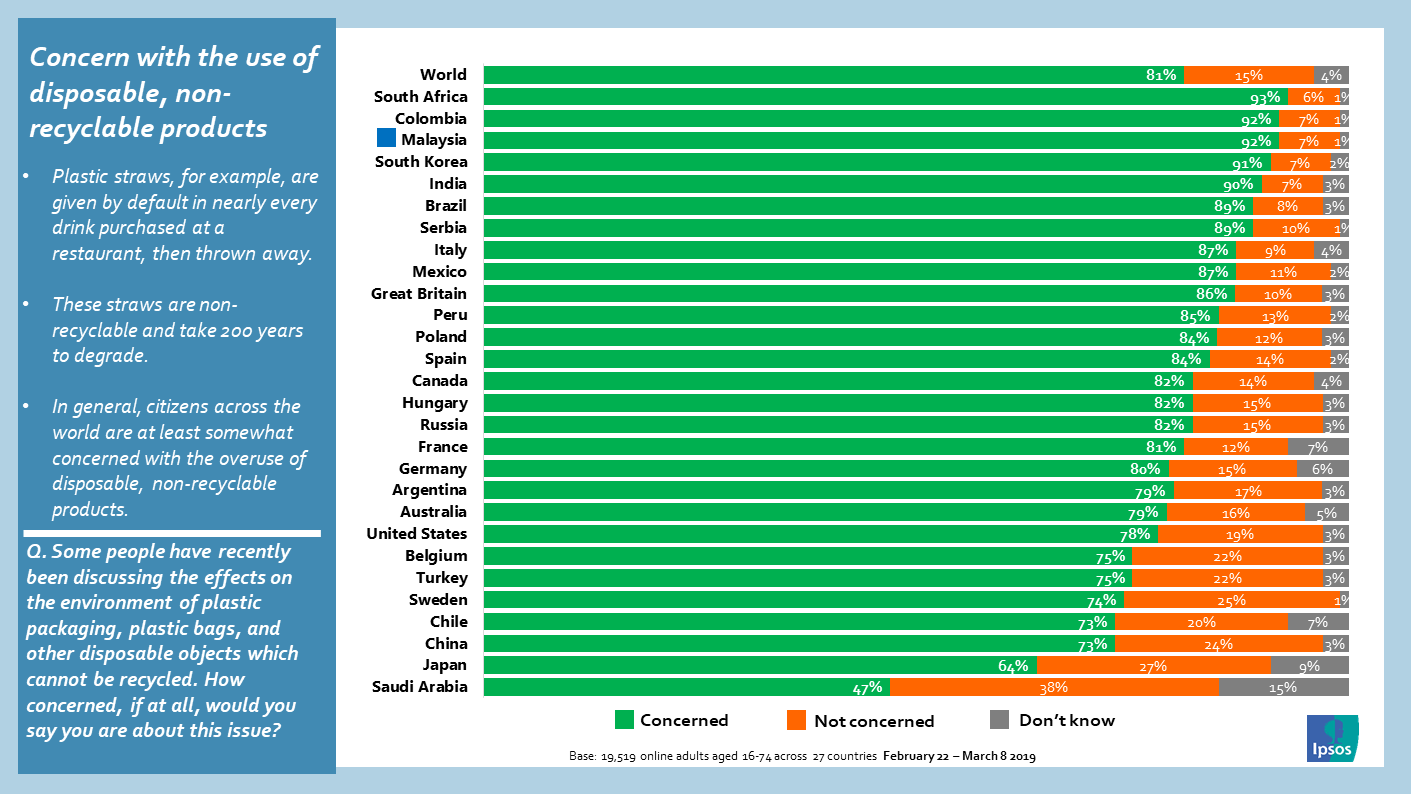 A separate Ipsos Global study was conducted across 28 countries in the first quarter of 2019 to understand public sentiment on a bevy of environmental issues. One environmental issue that Malaysians have a strong opinion about is the use of disposable, non-recyclable products. A staggering 92% (higher than the global average – 81%) of the people polled in Malaysia showed their concern with this major environmental issue.
A separate Ipsos Global study was conducted across 28 countries in the first quarter of 2019 to understand public sentiment on a bevy of environmental issues. One environmental issue that Malaysians have a strong opinion about is the use of disposable, non-recyclable products. A staggering 92% (higher than the global average – 81%) of the people polled in Malaysia showed their concern with this major environmental issue.
Going forward, in the Phase 2 of the Roadmap (which spans from 2022-2025), MESTECC plans to significantly increase the expansion scope of biodegradable and compostable plastic products for local use by providing R&D funding on alternative eco-friendly products. In this phase, the Federal Government also intends to impose a pollution levy on manufacture of plastic bags”
Arun Menon, Managing Director of Ipsos in Malaysia;
“The war against single-use plastic by the Malaysian government is an important step in the right direction and provides an opportunity for development in innovation across the circular economy segments such as packaging, communication and recycling.
South East Asia accounts for the highest global plastic consumption and an average Malaysian in general, unfortunately is still not fully aware that the country has one of the highest per capita plastic consumption globally. Government of Malaysia under MESTECC & KPKT, is vigorously driving the message across
Corporations such as Nestle has already started raising the bar for corporate sustainability. The private sector should see that a plastic free future as an opportunity as well as bringing a fundamental difference throughout the business model shift. We need to realise that awareness does not always lead to a behavioural shift which translates into every day life action
This is where the Govenment, private sector and advocators has to move in unison with the aim of changing behaviour to address the systematic systemic plastic crisis”
About the study:-
The survey data comes from an Ipsos tracking survey conducted between October 2018 and June 2019. The data was collected in three waves, each wave covering more than 1,000 respondents.
The study was conducted across Peninsular and East Malaysia, and is representative of the national population.

